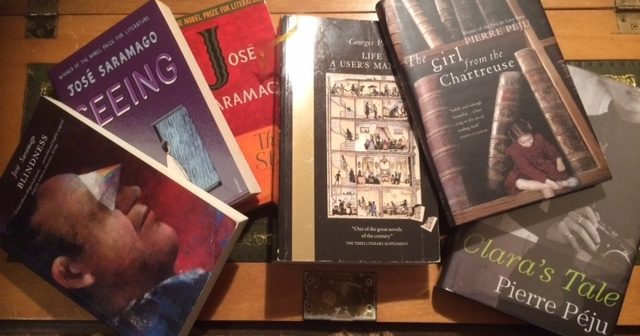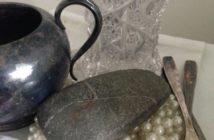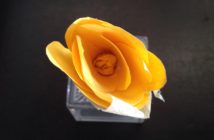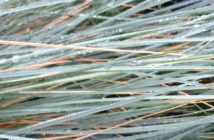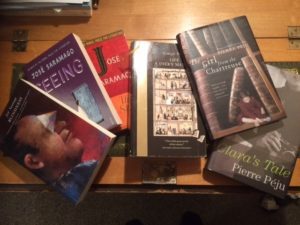
Translated European authors
Marcus Hobson, ARTbop’s Literary Author and Reviewer highlights European authors he says: “I have selected five European authors whom you may not know or may not have explored. For those who love a good film as well as a good book, you may have seen movies based on some of their original ideas.”
Jose Saramago from Portugal was awarded the Nobel Prize for Literature in 1998 and died in 2010. The movie Blindness with Julianne Moore was based on his book, as was Enemy with Jake Gyllenhaal. Saramago did not become famous or popular until in his sixties, but then produced some amazing stories. Seeing, for example, examines what happens when a general election is held and no-one turns out to vote. The people in the Polling stations wait and wait and no-body comes. Eventually the Government has to step in. Saramago wrote with an unusual style, often with no punctuation and paragraphs that can last for pages but his books are full of wonderful ideas and fanciful adventures. In The Stone Raft the Iberian peninsula of Spain and Portugal break away from Europe and begin to drift out into the Atlantic Ocean. Other titles include, Blindness, Seeing, The Cave, The Double, All the Names, and Death at Intervals.
Herman Hesse, was born in Germany but spent most of his writing life in Switzerland, winning the Nobel prize for literature in 1946 but only really starting to be well-known from the 1960s onwards. His interest in Eastern philosophy, and in particular the novel Siddhartha, may have accounted for this. The first book of his I read was Steppenwolf and was instantly hooked. The Glass Bead Game followed, and then my own personal favourite, Narcissus and Goldmund. This is the story of two boy sent to monastery for their education. Goldmund runs away to live a life of seductions and sensuality, eventually becoming a sculptor, while Narcissus stays on and eventually becomes Abbot of the monastery. When the two meet again years later they reflect on their lives and experiences. Who has seen and learnt more from their lives and who has been happier and more fulfilled, are the ultimate questions the book asks.
Arturo Perez-Reverte is from Spain and is still alive and writing. His books are adventure stories that began with tales not unlike those that made Dan Brown so famous. His stories have also been made into films with Captain Alatriste being a Dumas like character, fighting and drinking his way through the 17th Century. One of his early books became a Johnny Depp film, The Ninth Gate. The book was much better than the film. His best book by far is called The Painter of Battles, in which a retired war photographer is confronted by a man who simply announces that he has come to kill him. The photograph of his face became a symbol for a war and slowly he explains the terrible consequences that resulted. Perez-Reverte’s books range across many topics from drug dealing, underwater treasure hunting and war photography to ancient manuscripts and 17th century warfare.
Georges Perec was a French writer who died quite young in 1981. The son of Polish Jews, both his parents were killed in the Second World War, his father in the army, his mother in a prison camp. His work therefore has a great deal to do with absence and loss. One novel, entitled A Void, is written entirely without the use of the letter ‘E’. The fact that Perec’s names are full of Es means that he too disappears from the novel. I imagine the complexity of translating such a work from the original French to English, while retaining the original inventiveness was quite a headache. Perhaps his best work is Life: A User’s Manual, which observes a building and all its various inhabitants in minute and beautiful detail.
Pierre Peju is also French. Unlike all the other writers I mention where I have read most of their books, I have only read two novels by Peju. One is rightly famous, The Girl from the Chartreuse but the other is better and called Clara’s Tale. The first was a best seller but the second I found by accident and discovered it was deeper and more lyrical. It is the tale of Paul and Clara whose paths cross in unexpected ways over the course of their lives throughout the second half of the twentieth century. They are drawn to each other but can never manage to be together. © Marcus Hobson
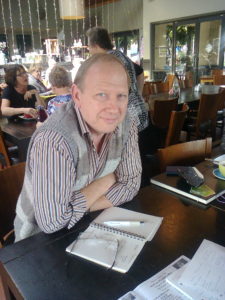 Marcus Hobson is the ARTbop Literary Editor, regular book reviewer, writer, and the Secretary of the Tauranga Writers group. Marcus has been, and continues to be, lots of things. An aspiring author of both novels and reviews, he has always said he wants to be a writer and 40 years later is making that come true. He has in the past done such varied things as study ancient and mediaeval history at Uni in London, worked as an archaeologist, as an economist in central and southern Africa, and as truck driver in a quarry. About two years ago he relocated to the beautiful Bay from a finance job in Auckland. He is a lover of art, the written word and a full time fanatical book collector, with over 3,000 volumes on his shelves. He lives close to Katikati with his wife and sometimes their three daughters, two cats, a library and the odd chicken. Marcus is currently working on a “factional” work about World War One.
Marcus Hobson is the ARTbop Literary Editor, regular book reviewer, writer, and the Secretary of the Tauranga Writers group. Marcus has been, and continues to be, lots of things. An aspiring author of both novels and reviews, he has always said he wants to be a writer and 40 years later is making that come true. He has in the past done such varied things as study ancient and mediaeval history at Uni in London, worked as an archaeologist, as an economist in central and southern Africa, and as truck driver in a quarry. About two years ago he relocated to the beautiful Bay from a finance job in Auckland. He is a lover of art, the written word and a full time fanatical book collector, with over 3,000 volumes on his shelves. He lives close to Katikati with his wife and sometimes their three daughters, two cats, a library and the odd chicken. Marcus is currently working on a “factional” work about World War One.
If you would like to contribute your original book reviews to ARTbop WORDS please forward them to info@artbop.co.nz for the attention of the Literary Editor Marcus Hobson. We prefer the work is emailed in docx format We appreciate one or two jpg images (not enormous ones as they become an uploading issue for ARTbop)


